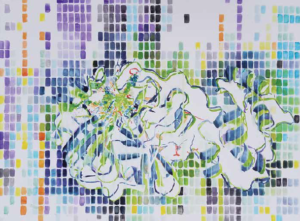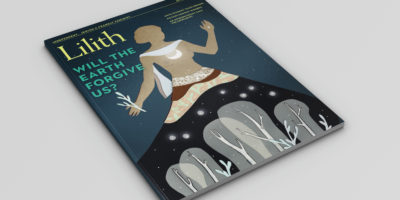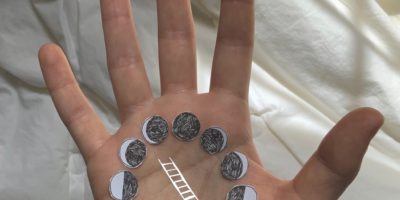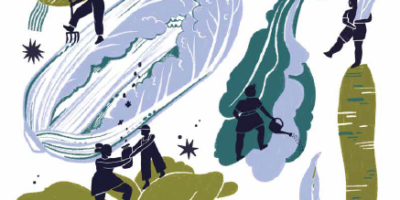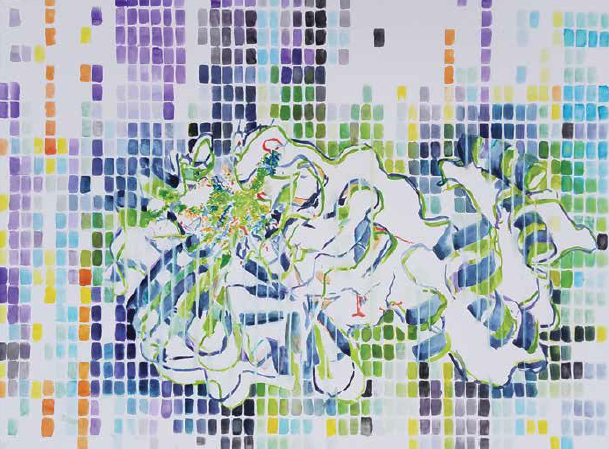
Fiction: Still Life
Second Prize in Lilith’s 2020 Fiction Contest.
MICHAL GAVISH, 1918, 2020; COURTESY OF LAMINA PROJECT; ©MICHAL GAVISH
IDA NEVER SAT for dinner. She ate standing over the counter as she filled bowls of chicken soup and plates of brisket and potatoes for her family. She moved from stove to table with second helpings, to replace dropped forks, to refill glasses, to clean up the smashed plate with the food her husband Morris said was drek.
“You know, it’s against Jewish law to eat standing up,” her brother the rabbi would say.
“It must be against Jewish law for men to help in the kitchen then, too,” Ida countered.
“Hmph. As if you’d let them.”
The husband is dead now. Good riddance. The four children escaped from this two-bedroom trap on the Lower East Side, one in a coffin. This used to be where the immigrants lived, the Jewish ones escaping the violence spreading across Eastern Europe. Ida came in 1929. Forty years later, a man has walked on the moon and Ida hasn’t moved. Now, the neighborhood is full of young pishers with beards and bupkes who think tenement living is exotic. There was one of them in the supermarket earlier today, standing in front of the dairy section. Just staring. Blocking traffic.
“Hey, can you get out of the way?” Ida said.
When he didn’t answer, Ida took her cart and gently, just a touch really, pushed it against the back of his knees. It was barely a tap. But the shmendrick started screaming.
“What’s wrong with you, you crazy old woman?!”
“Nothing some cream for my coffee won’t fix,” Ida answered, grabbing the carton and stalking off down the aisle.
Now, Ida takes a tuna fish sandwich to the table. Her gnarled fingers run through the grooves of the worn oak surface. Here is the dent from when her Yosele tripped and smashed his mouth into the edge. Here is the patch worn smooth by her first-born Saul’s restless fingers, a habit that made Ida want to reach into his belly to calm his quivers. Here is the stain from Esther’s tears when her fiancé was killed in the war, the second one. Here is where her baby Deenah knocked over her father’s whiskey and the hole made by the knife Morris stabbed into the wood shouting, vilde chaya, wild animal.
On the sideboard, is an arrangement of objects like the still lifes on the postcards her sister, the first to flee the pogroms in Lithuania, used to send her from London. The tureen, which Ida filled with matzoh ball soup on Friday nights, has a small chip from the rough seas that brought her to Ellis Island. It looks like an urn, a place for ashes. Perhaps she should ask her children to cremate her (another Jewish law broken), to place her burnt self in with the ghosts of all those chickens. Would they argue over whose mantel she would adorn or would they toss her around like a poison pill?
A blue enamel bowl holds the pins, needles, thread, and thimbles of her trade. Ida can no longer see well enough to sew her perfect stitches, but the dish remains. Why bother moving it? A small green bottle once held a tonic her doctor prescribed for something, she can’t remember what. Later, it held her hatpins.
Three paper flowers on long wire stems are a gift from a grandchild. Aside from the school portraits, Ida has few mementos to show for being a grandmother to eight. They all live in the suburbs now, where each child has their own room, and gefilte fish, chopped liver, and kishke don’t sully the counters with their immigrant stink.
Saul visits every other Sunday, always alone, never with the wife or the kids who are reserved for viewing on Passover or Rosh Hashanah. Before he takes his coat off, he pulls an envelope from the pocket and places it on the sideboard. Her allowance. On the last visit, he asked what she did with the money.
“I’ve been saving it,” Ida said, her chin lifted but her lips pouting—the adult in her battling with the child she always feels like with Saul.
“For what, Ma. Don’t answer that. I don’t want to hear about how you don’t trust banks, and what do you need the money for anyway because the union took good care of you and isn’t America great with its social security. Where do you keep all that money anyway?” Saul got up and started rifling through drawers and cabinets.
“You have no right to go through my things like that,” Ida said, following Saul around the apartment like a little girl afraid her father will find the Halloween candy she hid. The fact was, she couldn’t remember where she put the money.
“Under the couch cushion, Ma? You think that’s better than a bank. But this isn’t all of it.”
Saul continued his search. Ida followed behind him, her hands picking at his sleeve, begging him to stop. He found an envelope in the freezer, one in the soup tureen, another under the rug in the bedroom. “Oh, Ma.”
“I thought if a burglar came…” Ida began but didn’t want to concern Saul any further. “Come sit down. I’ll make some tea and maybe you’ll have a bissell piece of honey cake.”
When Saul came the next time, he placed the envelope in the top drawer of the sideboard, was satisfied that the other envelopes were there, and started to remove his coat.
“You have a loose button. Let me get my sewing kit to fix it.” Ida still feels as if she has to prove to Saul she hasn’t lost her mind so she turns to her talent as a seamstress.
“It’s okay, Ma. Susan can do it.”
“You don’t want her to prick one of her precious fingers, do you?”
“Ma, don’t start. Can we just visit? Did you make some of your honey cake?”
“You don’t like my honey cake. It’s too dry, you said the last time.”
“Just that once. Please. Let’s have tea and talk.”
Saul sat at the kitchen table while Ida bustled back and forth with cups, a teapot, lemon slices, sugar cubes for sipping the tea through, the honey cake, plates and forks. She told Saul the story about the idiot in the supermarket, although she leaves out the part about coming home and finding she already had two unopened cartons of cream in her refrigerator.
“You’ve got to be more careful, Ma. It’s not like it used to be when you knew everyone on the block.”
“What am I supposed to do, stay inside all day?”
“I’ve suggested more than once that we find you a new place out near us.”
“No. This is my home. Besides, at least when I’m here, I can make excuses for you and your sisters hiding your lives from me, but when I’m ten minutes away from you in some white-walled box with empty sidewalks and no stores nearby, what am I going to tell myself when the ayniklakh still don’t come to see me?”
After Saul left, Ida washed the plates, cups, spoons, and forks and stacked them in the dish drainer, where they would remain. Ida has learned its best to keep the dishes where she can see them rather than searching for the plate that ended up in the cabinet with the pots and pans or the utensils that she sometimes found in the drawer with the placemats.
IDA REACHES A dead end in her ruminations and is surprised when she sees the uneaten tuna fish sandwich in front of her. She doesn’t remember wanting it or making it. She takes it to the counter and stares at the familiar traffic lights—green, yellow, red; green, yellow, red. Repeat. Repeat. Repeat. Her eye is caught by a man holding an infant to his chest, kissing and stroking its crown. It’s the man from the supermarket. Ida thinks it must mean something that she remembers him. That their meeting was bashert, meant to be. She puts on her coat and goes downstairs. She’s wearing her black, lace-up orthopedic shoes but in her mind she is a young woman tripping down the stairs in high heels.
“Hey, mister, mister.”
“What?” the man says as he turns to see who is calling him.
Ida notices his honeyed skin, the chocolate of his eyes. There are flecks of paint on one cheek and under his fingernails. For a moment, she can’t speak. “I…I… Wait. Don’t walk away. I’m sorry. I’m not a crazy old woman. At least, I don’t think I am. If I’d known you had a baby. The times I fell into an exhausted stupor in front the dairy case or at the butcher or on the bus. Ach. Too many times to count.”
“Yeah. Well thanks for that,” he says. “We’re late for an appointment so we’re going to go.”
“Can I walk with you?”
“What? You don’t even know me. You can’t go asking strange men if you can walk with them.”
“You sound like my Saul. Who else am I going to talk to around here? Everyone is a stranger to me. All you artists think it’s so great to live here.”
“Hah. You misunderstand us. Not great. Just cheap.”
“Yeah. This place was all we could afford too. Why I’m still here. No. That’s not true. My Saul would pay for me to move out near him in the suburbs. Feh. This is my home. I’m Ida by the way.”
“Yusef.”
“I had a son named Joseph. We called him Yosele. He died before he had a chance to be a dad. Does that mean I was his mother or am I still?
“Still, Ida. Still,” Yusef says as he lays the baby in the carriage. Ida admires the round face, the eyes like his father’s, the skin a paler shade that Ida knows will ripen. She saw it in the skin of her own babies as they turned from pink to olive.
“His name is Ali.”
“Ali. What a sweet boy.” Pooh, pooh, pooh. Ida pretends to spit three times.
“Hey, why are you spitting on my kid?”
“I didn’t actually spit. It’s to ward off the evil eye ready to curse what you admire too much.”
Yusef pulls a necklace that was hidden under his shirt with an amulet of an eye set in blue on it. “I guess we all have our superstitions about the evil eye. You know, we don’t really have an appointment. I wanted an excuse to get away from you.”
“Haha. My kids would sympathize.”
“Look. I really do have to get home soon. It’s time for Ali to nurse and my wife is waiting. Let me walk you home.”
Ida remembers when her breasts were round and full of milk,
leaking each time one of her babies cried.
“Ida? Would you like me to walk you home?”
“Oh, sorry. No, no. I want to think.”
“We can walk in silence and we can both think.”
What Ida thinks as they walk doesn’t take the form of actual words. She listens to the snippets of music coming from open apartment windows, whatever it is that children shriek on the playground, the accents and intonations of foreign languages. She smells the yeast from the remaining bagel shop mixed with spices she will have to learn the names of.
She pictures Yusef coming to tea with his wife and Ali. She would be sure the honey cake was moist. She’d get a little present for the baby. Maybe a rattle. And she’d rearrange. She’d put away the tureen. Replace it with the tea set her sister left her when she died. The blue bowl would look pretty on her dining table, now bare of any adornment. She would throw the green bottle away and replace it with the crystal vase Saul gave her one year for her birthday. Ida thought it was too swanky for her, but now she would spend some of the money Saul gave her and get real flowers for it to replace the pretend ones from the granddaughter who seemed less real than little Ali. And she would tell Yusef that she was an artist too, take out the portfolio of clothes that she had designed. She knows they will never get made but she can feel the silks and velvets and wools against her skin as if they were real.
The next morning, Ida has no memory of Yusef or Ali. The soup tureen and paper flowers remain in their place. The dust on the portfolio remains undisturbed. But Ida’s body remembers that yesterday was different, that she still had a life. Her legs remember the flow of blood as she walked, her lungs the air she inhaled, her cheeks the heat of the sun. She puts the plates and glasses in the dish drain away, all in their proper places. She takes some money from one of Saul’s envelopes. Puts her coat on and goes outside. Today, she will buy something beautiful.
Judith Hannan is a writer and teacher. She leads workshops for those affected by illness, trauma, and social neglect. She is a writing mentor at Memorial Sloan Kettering Cancer Center and is on the boards of the Children’s Museum of Manhattan and Romemu, her synagogue.

